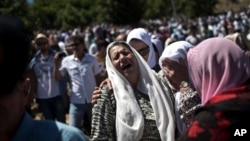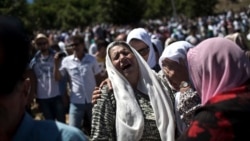This month marks the 20th anniversary of the Srebrenica genocide in Bosnia, where Bosnian Muslim men and boys were systematically murdered because of their religious identity.
Forces under the command of General Ratko Mladić besieged the enclave on July 11, 1995 and began killing more than 8,000 men and boys. Women and girls were raped and forcibly deported.
At the United Nations commemoration of the Srebrenica massacre, U.S. Ambassador to the U.N. Samantha Power spoke about Ratko Mladić's role in the genocide: He conquered a U.N. safe area without much of a fight; he convinced peacekeepers sheltering Bosnian civilians to turn them over to him; and he assured them they would be safe.
Ratko Mladić lied. He said that those who had done nothing wrong had nothing to fear. But he deemed every Bosnian Muslim man or boy in Srebrenica as someone who had done something wrong – simply because they were Muslim. And he ordered the execution of each of them. The only people who survived these systematic mass executions were those who were machine gunned but hid under the lifeless bodies of their neighbors, family members, and friends. Ratko Mladić was not a man who thought he would ever face justice.
But he was wrong. Today, Ratko Mladić is in The Hague facing trial. And the women left without sons and husbands and fathers bear witness against him.
After the tragedy in Srebrenica, said Ambassador Power, a divided international community came together – intervening militarily to enforce UN Security Council resolutions; pursuing those responsible for the genocide and – though in Mladić’s case it took nearly sixteen years – succeeding in securing his and other perpetrators’ arrests.
"We must never forget the genocide in Srebrenica," said Ambassador Power. "We must always honor its victims, its survivors. But we must never forget also that our words will ring hollow. . .if we don’t end the culture of impunity that exists in so many places around the world, and if we don’t strengthen our resolve to protect those who count on us all."
The marking of 20 years since the atrocities in Srebrenica should be foremost a time to pay respect to the victims and their families, as well as to all innocent victims of the war in Bosnia and Herzegovina. It is a time to reflect on the terrible tragedy of that war and to recommit to building a better future for the people of Bosnia and Herzegovina.






